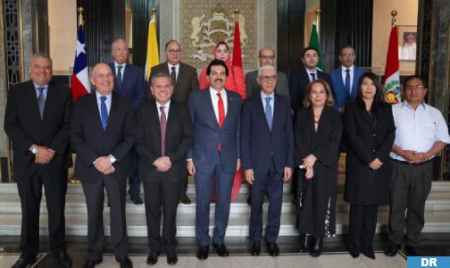Moroccan Sahara: Pacific Alliance Monitoring Inter-Parliamentary Commission Supports Moroccan Autonomy Initiative
The Pacific Alliance Monitoring Inter-Parliamentary Commission affirmed, Thursday in Rabat, its support for the autonomy initiative of the southern provinces of the Kingdom in order to find a solution to the dispute over the Moroccan Sahara. In the final statement issued at the end of the joint meeting between the Inter-Parliamentary Commission and the House of Representatives, the Commission considered that the Moroccan initiative is “a serious and credible effort,” adding that “the extended autonomy plan, proposed by Morocco to resolve the Sahara conflict, meets the expectations of all parties”. Given that Morocco is an observer member of the Pacific Alliance, located on the Atlantic shore of the African continent, which shares the moral, political and economic values supported by the Pacific Alliance, and in relation to the negotiation process under the auspices of the United Nations to resolve the Moroccan Sahara conflict, the Pacific Alliance Monitoring Inter-Parliamentary Commission, supports this negotiation process in accordance with the resolutions formulated by the UN Security Council. The Commission also pointed out that the autonomy plan has received, since its submission to the United Nations on April 10, 2007, the support of the Security Council, which unanimously approved it through resolution 1754 of April 30, 2007, calling it a serious and credible initiative. It is also worth mentioning the recognition and involvement of several countries and bodies that see in the Moroccan initiative an opportunity to move forward to find a political solution to an issue that has been stagnant for over 30 years, added the Commission. The autonomy plan proposed by Morocco to resolve the Sahara conflict meets the aspirations of all parties, insisted the Commission, adding that the southern provinces, in accordance with the development policy adopted by the government in the Moroccan Sahara, enjoy social and economic prosperity like other regions in Morocco. According to the final statement, Morocco is “a state of law and order, where the institutions responsible for guaranteeing human rights are independent”. Thus, the Pacific Alliance Monitoring Inter-Parliamentary Commission affirmed that the Bureau of the Commission expresses its support and constant commitment to the Security Council resolutions. The same source added that the Bureau of the Commission, like other members of the international community and the United Nations, appreciates this initiative as a “serious and credible” effort, which will certainly allow the inhabitants of the Sahara to exercise their right to democratically manage their affairs through legislative, executive and judicial bodies with exclusive competences within the framework of the full sovereignty of the Kingdom of Morocco. Furthermore, the Bureau of the Commission commended Morocco’s African and Arab leadership and its strong commitment to fruitful and proactive South-South cooperation, adding that the Kingdom is a credible partner in the face of common challenges such as peacekeeping and security, food security, social development and environmental protection. Following the measures taken by the Kingdom of Morocco to secure the passage of El Guergarat, the Commission had issued a statement on December 10, 2020, in which it reiterated its full support for the Moroccan autonomy plan as the only political solution under the auspices of the United Nations and under the sovereignty of the Kingdom of Morocco. It had also stressed its support for the measures taken by the Kingdom to maintain security and ensure the movement of goods, people and services through El Guergarat. The Pacific Alliance is a regional integration initiative composed of four countries: Chile, Colombia, Mexico and Peru, and more than 60 observer members and represents about 40% of Latin America’s GDP.

